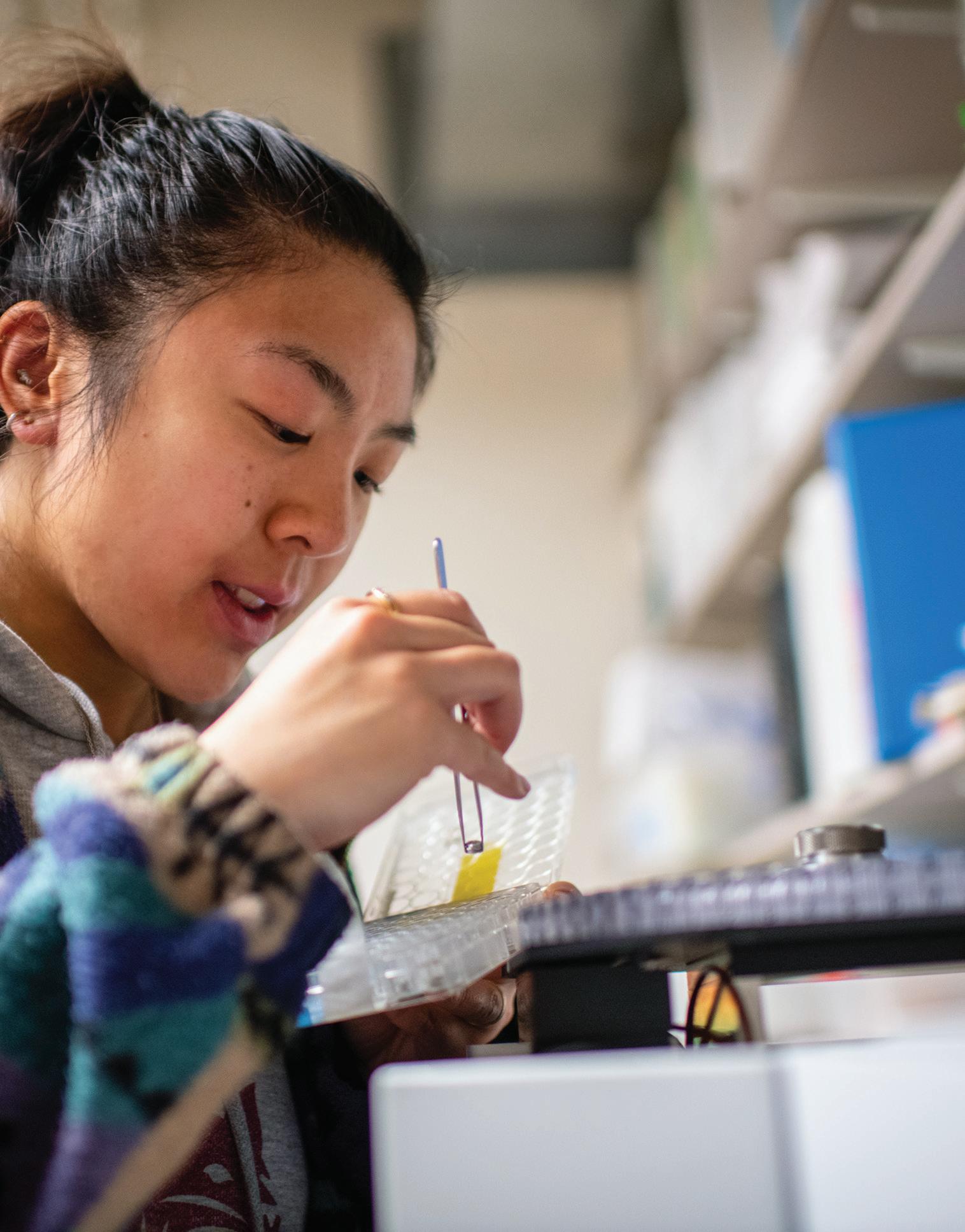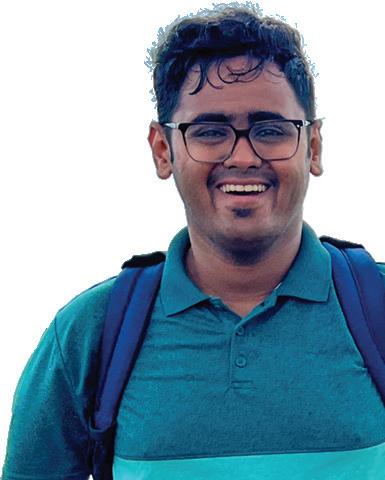

Innovation in MARINE SCIENCE
WELCOME TO SMAST
UMass Dartmouth’s School for Marine Science & Technology (SMAST) is a nationally and internationally recognized institution for graduate education and research in marine sciences, fisheries, and ocean technology.
There is a strong demand for marine scientists to address the urgent issues facing the marine environment and the planet. SMAST scientists play a key role in addressing these issues,
• Climate Change and Ocean Impacts
• Food Security via Sustainable Fisheries
• Sustainable Energy Development and Associated Impacts
• Coastal Ecosystem Resilience



Leaders in the field
SMAST is home to the leading marine science programs in the University of Massachusetts system and brings in more than $6-$9 million of annual research funding from government, industry, and nongovernmental agencies each year.
About UMass Dartmouth
UMass Dartmouth is a top-tier national research university, with a Carnegie classification of R2: Doctoral Universities – High Research Activity. More than one third of the University’s research funding comes from SMAST research activities. Graduate students from all over the world come to UMass Dartmouth to study and work alongside accomplished faculty mentors on cutting-edge research projects.
About SMAST
Located on Clark’s Cove in historic New Bedford, MA, SMAST is home to scientists who conduct extraordinary research in our community and all over the world, from the Arctic to the tropics. On the home front, SMAST faculty play a pivotal role in driving the blue economy by promoting workforce training and education in the growing offshore wind industry, and providing internship opportunities to students historically underrepresented in STEM and marine science.
New Bedford, MA has long been the highestvalued fishing port in the nation, thanks in no small part to the efforts of SMAST researchers. SMAST emphasizes cooperation and collaboration with industry and government entities on compelling regional marine-related issues and technological development.

FACULTY
Faculty mentors help new scientists gain the confidence and experience they need to be successful in their fields

SMAST faculty are world-renowned leaders of marine science research coupled with the development of innovative technologies. Our faculty collaborate with government and nongovernment organizations around the globe to develop innovative technology, perform cutting-edge research, and address complex issues that affect marine ecosystems.
Students engage in curiosity-driven and societally relevant research. Learning is interdisciplinary and involves observation, modeling, experimentation, and theory. Our faculty and students partner with agencies at the local, national, and international levels.
I couldn’t ask for a better advisor than Steve Cadrin. He is extremely supportive but offers just the right amount of autonomy.”
- Jessica Kittel PhD ’25



Estuarine and Ocean Sciences faculty
Department of Estuarine and Ocean Sciences faculty pursue state-of-the-art basic and applied marine science research centered on the development of innovative technologies.






Mark Altabet
Commonwealth Professor and Chair of the Department of Estuarine and Ocean Sciences
Focuses on ocean nutrient biogeochemistry and interactions with climate change as well as the development of novel technologies for its study.
Jim Bisagni
Professor Emeritus
Specializes in remote sensing of sea surface temperature and ocean pigments, remote sensing of dynamic ocean topography and surface waves, and air-sea interaction.
Wendell Brown
Professor Emeritus
Specializes in coastal physical oceanography, moored ocean observations, real-time circulation modeling, and data/information management system development
Avijit Gangopadhyay
Commonwealth Professor Emeritus
Focuses on ocean circulation, operational modeling, and climate studies.




Micheline Labrie
Assistant Professor
Specializes in coastal biogeochemistry, leading the Coastal Systems Program in analyzing water quality, nutrientrelated ecosystem health, and coastal pollution remediation measures.
Steven E. Lohrenz
Professor
Research areas include the study of biological distributions and productivity, as well as cycling of carbon and nutrients in coastal and ocean waters.

Pia Moisander, PhD
Professor of Biology and SMAST Affiliate Professor
Research interests include marine microbial ecology, microbiomes, marine nitrogen cycle, and marine biofouling.
Daniel MacDonald
Professor of Civil Engineering
Specializes in estuarine oceanography, hydrodynamics, stratified turbulence, and environmental engineering.
Cindy Pilskaln
Professor Emerita
Focuses on geochemical particle fluxes in the ocean and large lake systems with emphasis on their quantitative relationship to climate forcing over short- and long-time scales
Miles Sundermeyer
Professor
Specializes in dispersion and transport processes, numerical modeling of mixing and stirring, and numerical modeling of physical and biological interactions.
Amit Tandon
Commonwealth Professor of Mechanical Engineering and SMAST Affiliate Professor
Specializes in small-scale turbulence in the upper ocean boundary layers as well as theory, simulations, and observational analysis of sub-mesoscale features in the ocean.
Fisheries Oceanography faculty
Department of Fisheries Oceanography faculty conduct cutting-edge research in interdisciplinary sciences related to interactions between marine organisms, the marine environment, and fisheries.






Pingguo He
Professor and Chair of the Department of Fisheries Oceanography
Specializes in fish behavior and fishing gear as well as sustainable utilization of fisheries resource of the northeastern U.S. and beyond.
Lauran Brewster
Assistant Professor Research is focused on anthropogenic and environmental impacts on fish behavior and energetics; tagging technology.
Steve Cadrin
Professor
Specializes in general fisheries science that is relevant to resource management, population modeling of fishery resources, and spatial population structure and movement.
Changsheng Chen
Commonwealth Professor and Montgomery Charter Chair Research interests include modeling and observational explorations of multi-scale global-regional-estuarine ocean circulation, and oceanic fronts.
Geoffrey Cowles
Associate Professor
Specializes in the application of numerical methods to problems in fluid and ecosystem dynamics, including both scheme development and applications.
Adam Delargy
Research Assistant Professor
Research interests include statistical and mathematical analyses of fisheries data.






Gavin Fay
Associate Professor
Concentrates on the development of interdisciplinary modeling approaches, ecosystem assessment methods; and testing the performance of decision support tools for living marine resource management.
Daniel Georgianna
Chancellor Professor Emeritus Research areas include marine resource economics, comparative economic systems, and economic history.
Jianhua Qi
Research Associate Professor Research interests include numerical modeling and observational exploration of coastal ocean circulation as well as physical processes such as temperature and salinity.
Brian Rothschild
Professor Emeritus, Former Dean of SMAST Research areas include population dynamics, fishery management, and ocean ecosystems.
Kevin Stokesbury
Dean, School for Marine Science and Technology and Commonwealth Professor
Concentrates on marine biology/ecology focusing on fisheries, including scallop population dynamics and life history studies.
Jefferson Turner
Chancellor Professor of Biology and SMAST Joint Professor
Concentrates on plankton and water-quality ecological surveys of Buzzards Bay, plankton communities of Boston Harbor and adjacent waters, and interactions between copepod feeding and reproductive success.
MS in Marine Science and Technology
• Thesis or non-thesis option
• Thesis option requires 30 credit hours (minimum)
• Non-thesis option requires 33 credit hours
• Full-time students normally complete degree requirements in 4 semesters
• Part-time students are encouraged to take 2 courses per semester
Professional Science Master’s in Coastal and Ocean Administration, Science and Technology (COAST-PSM)
• 2-year program
• Non-thesis degree that focuses on marine science with additional coursework in management, policy, or law
• Flexible course work and course structure, including online courses
• 3 core courses (9 credits) required
• Internship required, usually during final semester of program
• Paid stipends are available
• Post-graduate employment in marine-related fields may be arranged
• Accelerated Coastal & Ocean Administration, Science and Technology Professional Science Master’s Program (COAST-PSM). Accelerated program offered in partnership with Mass Maritime Academy
PhD in Marine Science and Technology
• Requires 4 core, 3-credit courses (biological, chemical, physical, and marine policy)
• Additional elective courses may be selected in a concentration area of your choice
• Concentrations include 24 credit hours of courses (minimum), including elective and seminar courses
• 18 credit hours toward dissertation research required after completing rigorous comprehensive exam
• Cumulative GPA of 3.0 in the PhD degree program is required
Dual-Degree PhD Program with University of São Paulo Institute of Oceanography
• Requires 4 (12 credits total) core courses in a concentration area beyond the core, seminars, and dissertation research
• Concentrations include 24 credit hours (minimum), including elective and seminar courses
• 18 credit hours (minimum) must be applied toward thesis research after completing a rigorous comprehensive exam
• Cumulative GPA of 3.0 in the PhD degree program is required
• Students are referred to the degree requirements of their home institution


FACILITIES
SMAST consists of two facilities located on Clark’s Cove in New Bedford, MA: the 32,000 square foot building at SMAST West and the newly constructed 64,000 square foot building at SMAST East.
SMAST West houses a number of labs as well as the all-new Biodegradability Lab, the Acoustic-Optic Test Tank, and a research pier. SMAST East houses modern classrooms and conference facilities, a seawater lab, as well as wet, dry, and computational labs.

Seawater Labs
The 6,000-square-foot SMAST East Seawater Lab and 2000 square-foot SMAST West Seawater Lab are designed to allow scientists to conduct multiple experiments simultaneously and is configured with the flexibility to accommodate diverse research needs.
Acoustic-Optic Test Tank
SMAST’s 90,000-gallon Acoustic-Optic Test Tank is designed for the development and testing of underwater measurement concepts and devices, and as a resource for local academic, government, and industrial researchers and product developers.
Biodegradability Lab
Opened in 2022, the Biodegradability Lab at SMAST is a state-of-the-art research and product development facility equipped to study the biological breakdown of plastics in natural environments and provide businesses with a space to test sustainable products and materials.


OUTCOMES
SMAST alumni go on to prestigious postdoctoral positions and careers with leading organizations around the globe:
• Atlantic White Shark Conservancy
• Federal University of Ceará—Brazil
• Maine Department of Marine Resources
• Massachusetts Department of Environmental Protection
• Massachusetts Division of Marine Fisheries
• National Center for Atmospheric Research
• New England Fishery Management Council
• National Oceanic and Atmospheric Administration
• Ocean Wind
• Ørsted
• Shanghai Ocean University
• SouthCoast Wind
• Texas A&M University
• Vineyard Wind
• Woods Hole Oceanographic Institution
There is no equivalent fishery science program on the East Coast, and students who graduate from SMAST have a proven track record of success in the fisheries field.”
- Cate O’Keefe PhD ’13




RESEARCH WITH LOCAL AND GLOBAL IMPACT
From local coastal ecosystems to global ocean models, the impact of SMAST research can be felt all over the world. Students engage in research that informs action and policy.
As part of your academic experience, you will have the opportunity to:
• Conduct scholarly marine research in the field and in the lab
• Engage in cooperative research with government and non-government organizations at local, national, and international levels
• Publish in scholarly journals
• Present at conferences, seminars, and workshops


AFFORDABILITY
Funding your advanced degree in marine science
SMAST students receive funding from a variety of sources, including research assistantships, stipends, scholarships, and public and private research funds. Applicants should take an active role in contacting faculty member(s) who could potentially advise them, as well as make an effort to seek funding before applying.
I’ve been able to get consistent travel and research funding... I’ve been given the ability to venture out, do research, present at conferences, and connect with people from all over the U.S. and the world.”
- Siddhant Kerhalkar PhD ’25




Located in New Bedford, the nation’s #1 most valuable fishing port

$6.8M in research awards FY ‘24 57 research grants FY ‘24 4 state of the
Our location
SMAST is located on the water in New Bedford, MA. The Port of New Bedford is a deep-water commercial port, and is approximately 9 nautical miles from Cape Cod, 83 miles south of Boston, and 166 miles north of New York. We’re just minutes from UMass Dartmouth’s 710-acre main campus with affordable housing options on the SouthCoast of Massachusetts. We are strategically situated in a location that provides convenient access to many attractions.



umassd.edu/graduate/apply/ For complete details about our programs, the application process and requirements, or to apply online, please visit:
MASSACHU SETTS
RHODE ISLAND CAPE COD
CONNECTICUT
NEW HAMP SHIRE
NEW YORK VER MONT
Providence
Boston
